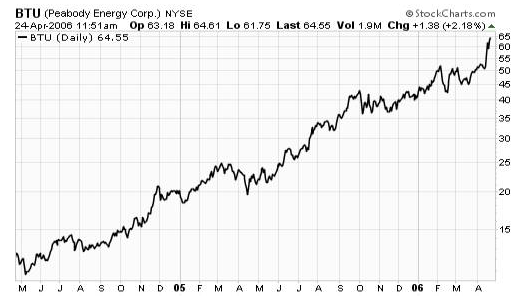| Home | About Us | Resources | Archive | Free Reports | Market Window |
Alexander’s Nuclear Potato TradeBy
Wednesday, April 26, 2006
What if the most respected trader, on the biggest trading floor in New York, working for the most prestigious trading firm in the world, offered to be your own personal trading mentor? He’d tell you exactly what trades to make and when to make them. Then he’d explain his thought process... not in the punchy, rushed, screw-you method you’d expect from a heavyweight trader, but with the soft tone and patience of a piano teacher. You’d make a ton of money and learn the ropes at the same time. This good fortune came to Michael Lewis. Lewis was a bond salesman for Salomon Brothers during the 80s and then told his story in a book called Liar’s Poker. It’s an investment classic and made Lewis into an instant Wall Street celebrity. When Lewis joined Salomon, it was the most profitable trading firm in the world. They ruled the markets. A job at Salomon Brothers was the best job in finance. You were an automatic hotshot. “[It] was somewhere near the centre of a modern gold rush,” he writes. “Never before have so many unskilled twenty-four-year-olds made so much money in so little time as we did this decade in London and New York.” Thing was, Lewis was as green as a pea when he started and he had no idea how to make money for Salomon Brothers. “It was only a matter of time before I embarrassed myself horribly,” he recalls. Luckily for Lewis, a bond trader called Alexander took him under his wing. Alexander was a gifted trader. Lewis describes him as the closest thing he ever met to a master of the markets. Alexander made his first killing in the stock market while still in the seventh grade. He had his first hundred thousand dollar loss before he’d turned twenty... on a trade in t-bill futures. At Salomon Brothers, he’d advise the managing directors what to do with their own money. He was that good. You’d think an MD at Salomon Brothers would be comfortable making his own investment decisions. Not with Alexander around... They’d ask him for advice every day. “His customers – and his bosses – simply did whatever he told them to,” says Lewis. According to Lewis, Alexander had a knack for interpreting events around him and he moved fast. When news broke, he already had his responses planned. He trusted his nose and reacted on instinct. Many of the trades Alexander recommended to Lewis had one of two characteristics: First, when investors were all doing the same thing, he would actively seek to do the opposite. Second, after a major dislocation in the markets – like a crash, a natural disaster, or the breakdown of a political agreement – Alexander would look away from the obvious impact and seek the secondary or tertiary effects that other investors hadn’t thought of yet. Here’s an example. Minutes after the news of the nuclear meltdown at Chernobyl hit the wires, Alexander called Lewis and told him to buy potatoes. Everyone else was thinking about the stocks of companies involved with nuclear power. And crude oil prices. But Alexander was thinking about the cloud of fallout threatening Europe’s food and water supplies. If the European potato crop became contaminated, American potatoes would soar in value. Brilliant! Or what about this current example... The Iranian president could create a dislocation in the energy markets with his nuclear ambitions... but what if he dropped his plans and signed a treaty? Cheaper oil... cheaper fuel... I expect Alexander would be ready to buy the airline stocks. Or what if Israel announced a deadline and threatened to drop bombs? Do you have the bases covered? Alexander would probably load up on Canadian dollars before funds stampeded into Canadian oil investments. Or what if something else caused an oil spike? This time a play on Canadian oil companies might be too obvious... I would buy railroad stocks. An oil spike would lead to a gasoline spike. Because the railroad is more fuel-efficient than the trucking industry, business flows from the trucks to the trains and railroad stocks go up. Not many people think of railroad stocks when they imagine a refinery in flames. But to be a great speculator, this is how you need to think... Good investing, Tom Dyson Market NotesTWO BIG ANOUNCEMENTS ON COAL Two incredible pieces of news hit the energy markets last week… The USA’s largest producer of coal, Peabody Energy (BTU), said its first quarter profit more than doubled. Higher production and strong coal prices were cited. The news from the nation’s #2 producer, Arch Coal (ACI) was nearly the same. First quarter profit rose 10-fold, blowing away estimates. The announcements sent both stocks up 10% in a single day. There’s a simple reason for the huge rise in coal mining profits. It’s the same reason for increased profits in mining copper, zinc, and iron ore. The reason is Asia. As this area of the world plays economic catch up with Europe and the US, it consumes huge amounts of energy. Coal and oil prices rise. Mining profits increase… The end result is a stock chart like this:
Peabody Energy (2-year chart):  While you can play rising coal consumption with a producer like Peabody or Arch Coal, we encourage you to check out the February 1st edition of DailyWealth for one of our favorite plays on the world’s appetite for energy. |
Recent Articles
|

